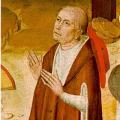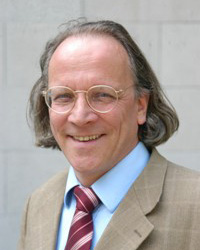375. Paul Richard Blum on Nicholas of Cusa
Posted on
Learned ignorance, coincidence of opposites and religious peace: Paul Richard Blum discusses the central ideas of Nicholas Cusanus.
Themes:
Further Reading
• P.R. Blum, Philosophy of Religion in the Renaissance (Farnham: 2010).
• P.R. Blum, Philosophers of the Renaissance (Washington DC: 2010).
• P.R. Blum, Studies on Early Modern Aristotelianism (Leiden: 2012)
• P.R. Blum, "The Analogy of Divine Creation in Raymond Lull and Nicholas of Cusa," Archivio di Filosofia 84 (2016), 117-28.
• P.R. Blum, "Nicholas of Cusa in Giles Randall's English Translation: Wisdom and Vision in Language," Recherches de Théologie et Philosophie médiévales 83 (2016), 201-19.
• P.R. Blum, Nicholas of Cusa on Peace, Religion, and Wisdom in Renaissance Context (Regensburg: 2018).







Comments
Add new comment